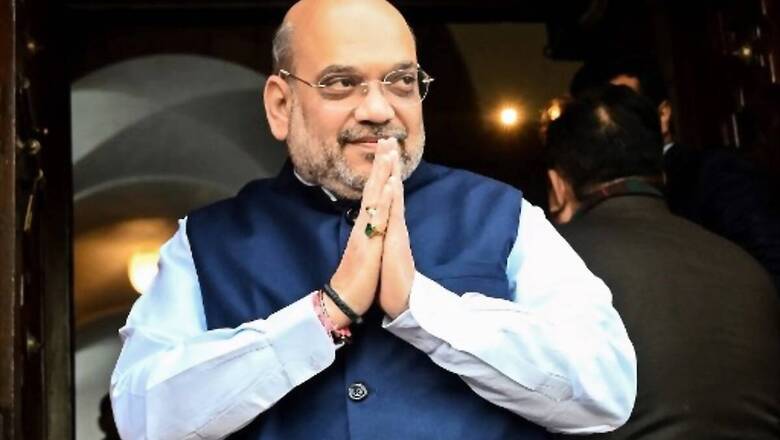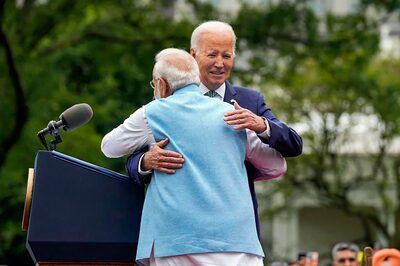
views
The government informed Parliament on Tuesday that implementation of the Citizenship (Amendment) Act (CAA), 2019, would take more time, while no decision has been taken yet on pan-India roll-out of the National Register of Citizens (NRC).
The Ministry of Home Affairs, which is framing the rules for the implementation of the CAA, has sought time till April from the Lok Sabha subordination legislation committee and July from the Rajya Sabha committee.
The extension of time was revealed by Minister of State for Home Affairs Nityanand Rai in response to a question from Kerala Congress MP VK Sreekandan in Lok Sabha. “Committee on subordinate legislation, Lok Sabha and Rajya Sabha, have granted extension of time till 9.4.2021 and 9.07.2021, respectively to frame CAA rules,” Rai said.
The first phase of census and updation of the National Population Register (NPR) has also been postponed due to the coronavirus pandemic, Rai informed the House, according to an ANI report.
This is the third time the MHA has sought extension of time to frame rules for CAA. The first extension was sought in July and the second in October, as per officials. According to parliamentary procedures, the ministry concerned has to frame rules within six months of the bill becoming an Act for its effective implementation.
It was widely speculated that government might frame the CAA rules ahead of West Bengal elections. CAA has been one of the main poll planks of the BJP in Bengal. However, the same issue has the potential of backfiring in Assam, which is also going to polls around the same time. Assam has been rocked by anti-CAA protests since the law was proposed.
A senior BJP leader closely involved with Bengal poll campaign, however, exuded confidence that the delay in framing rules will not affect the party’s prospects. The leader citing the example of Mathua community said, “The Mathuas in Bengal will vote for BJP even if the rules are not framed. The fact remains that no other party has passed this law. That credit no one can take away from the Modi government,” he said.
The CAA was passed by the Lok Sabha on December 9, 2019 and by the Rajya Sabha on December 11, 2019. It got the President’s nod on 12 December and the MHA issued a notification stating that the Act would come into force from January 10, 2020.
The objective of the CAA is to grant Indian citizenship to persecuted minorities — Hindu, Sikh, Jain, Buddhist, Parsi and Christian — from Pakistan, Bangladesh and Afghanistan. People from these communities who had come to India till December 31, 2014 due to religious persecution in these countries will not be treated as illegal immigrants but given Indian citizenship.
This means that people from these six religions will not be deported for not having valid documents, and instead will be given citizenship. Moreover, all legal proceedings against them for illegally entering India will be closed.
Meanwhile, the MHA told the Parliamentary Standing Committee on Home Affairs, headed by Congress leader Anand Sharma, that no decision has been taken to create National Register of Indian citizens.
“It has been clarified at various levels in government time and again that till now no decision has been taken to create National Register of Indian citizen,” the ministry said, according to a report tabled in Parliament on Tuesday.
The NRC was updated in Assam to identify bona fide Indian citizens living in the state, but the exercise had created a nationwide uproar. A total of 3.3 crore people in Assam had applied to be included in it. Of them, 3.11 crore have been included in the document and 19.06 could not find place in the NRC, according to the final report published in August 2019.
The parliamentary committee had earlier observed that there is a lot of dissatisfaction and fear among the people regarding the NPR and census.
In the action taken by the government on the committee recommendations with regard to the issue of fears associated with the NPR and census, the MHA said all individual-level information collected in census are confidential. In census, only aggregated data are released at various administrative levels. Like the earlier censuses, wide publicity measures would be taken up for creating proper awareness among public so as to conduct and complete the Census 2021 successfully.
The ministry said questionnaires for census along with that of the NPR have been tested at drive conducted successfully across the country. The committee was also of the view that Aadhaar data should be used in the upcoming census to reduce the duplicity and wastage of expenditure. To this, the government has replied that NPR and Aadhaar are separate exercises with the former collecting more detailed data.
“Aadhaar number has been developed as a separate database which is being used only for de-duplication purpose and authentication of beneficiaries of various government schemes,” the home ministry said. The committee in its final observation noted that Aadhaar already has biometric information of the individuals and so the already stored Aadhaar metadata of the individuals may be used in creating a family database for the upcoming census.
(With PTI inputs)
Read all the Latest News, Breaking News and Coronavirus News here




















Comments
0 comment